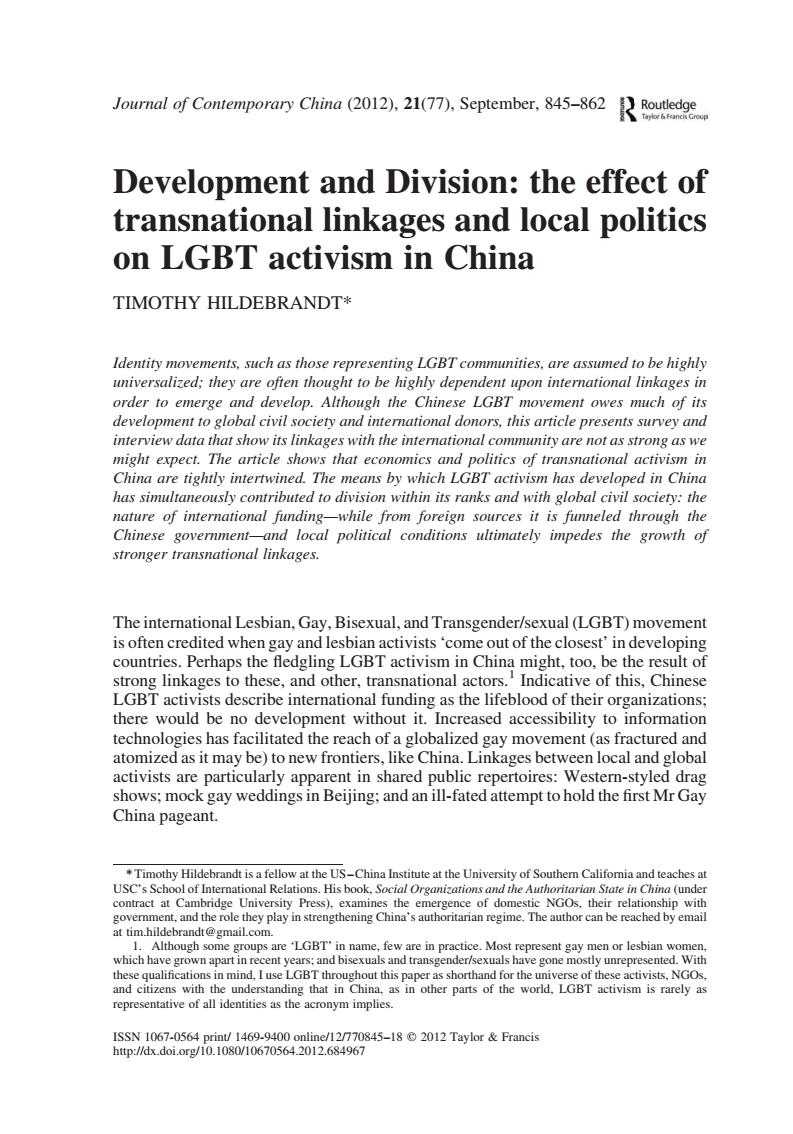正在加载图片...

Journal of Contemporary China (2012),21(77),September,845-862 Routledge Development and Division:the effect of transnational linkages and local politics on LGBT activism in China TIMOTHY HILDEBRANDT* Identity movements,such as those representing LGBT communities,are assumed to be highly universalized;they are often thought to be highly dependent upon international linkages in order to emerge and develop.Although the Chinese LGBT movement owes much of its development to global civil society and international donors,this article presents survey and interview data that show its linkages with the international community are not as strong as we might expect.The article shows that economics and politics of transnational activism in China are tightly intertwined.The means by which LGBT activism has developed in China has simultaneously contributed to division within its ranks and with global civil society:the nature of international funding-while from foreign sources it is funneled through the Chinese government-and local political conditions ultimately impedes the growth of stronger transnational linkages. The international Lesbian,Gay,Bisexual,and Transgender/sexual(LGBT)movement is often credited when gay and lesbian activists 'come out of the closest'in developing countries.Perhaps the fledgling LGBT activism in China might,too,be the result of strong linkages to these,and other,transnational actors.'Indicative of this,Chinese LGBT activists describe international funding as the lifeblood of their organizations; there would be no development without it.Increased accessibility to information technologies has facilitated the reach of a globalized gay movement(as fractured and atomized as it may be)to new frontiers,like China.Linkages between local and global activists are particularly apparent in shared public repertoires:Western-styled drag shows;mock gay weddings in Beijing;and an ill-fated attempt to hold the first Mr Gay China pageant. *Timothy Hildebrandt is a fellow at the US-China Institute at the University of Souther Califoria and teaches at USC's School of International Relations.His book,Social Organizations and the Authoritarian State in China (under contract at Cambridge University Press).examines the emergence of domestic NGOs.their relationship with government,and the role they play in strengthening China's authoritarian regime.The author can be reached by email at tim.hildebrandt @gmail.com. 1.Although some groups are 'LGBT'in name,few are in practice.Most represent gay men or lesbian women, which have grown apart in recent years:and bisexuals and transgender/sexuals have gone mostly unrepresented.With these qualifications in mind,I use LGBT throughout this paper as shorthand for the universe of these activists,NGOs. and citizens with the understanding that in China,as in other parts of the world,LGBT activism is rarely as representative of all identities as the acronym implies. ISSN 1067-0564 print/1469-9400 online/12/770845-18 2012 Taylor Francis http:/.doi.org/10.1080/10670564.2012.684967Development and Division: the effect of transnational linkages and local politics on LGBT activism in China TIMOTHY HILDEBRANDT* Identity movements, such as those representing LGBT communities, are assumed to be highly universalized; they are often thought to be highly dependent upon international linkages in order to emerge and develop. Although the Chinese LGBT movement owes much of its development to global civil society and international donors, this article presents survey and interview data that show its linkages with the international community are not as strong as we might expect. The article shows that economics and politics of transnational activism in China are tightly intertwined. The means by which LGBT activism has developed in China has simultaneously contributed to division within its ranks and with global civil society: the nature of international funding—while from foreign sources it is funneled through the Chinese government—and local political conditions ultimately impedes the growth of stronger transnational linkages. The international Lesbian, Gay, Bisexual, and Transgender/sexual (LGBT) movement is often credited when gay and lesbian activists ‘come out of the closest’ in developing countries. Perhaps the fledgling LGBT activism in China might, too, be the result of strong linkages to these, and other, transnational actors.1 Indicative of this, Chinese LGBT activists describe international funding as the lifeblood of their organizations; there would be no development without it. Increased accessibility to information technologies has facilitated the reach of a globalized gay movement (as fractured and atomized as it may be) to new frontiers, like China. Linkages between local and global activists are particularly apparent in shared public repertoires: Western-styled drag shows; mock gay weddings in Beijing; and an ill-fated attempt to hold the first Mr Gay China pageant. * Timothy Hildebrandt is a fellow at the US–China Institute at the University of Southern California and teaches at USC’s School of International Relations. His book, Social Organizations and the Authoritarian State in China (under contract at Cambridge University Press), examines the emergence of domestic NGOs, their relationship with government, and the role they play in strengthening China’s authoritarian regime. The author can be reached by email at tim.hildebrandt@gmail.com. 1. Although some groups are ‘LGBT’ in name, few are in practice. Most represent gay men or lesbian women, which have grown apart in recent years; and bisexuals and transgender/sexuals have gone mostly unrepresented. With these qualifications in mind, I use LGBT throughout this paper as shorthand for the universe of these activists, NGOs, and citizens with the understanding that in China, as in other parts of the world, LGBT activism is rarely as representative of all identities as the acronym implies. Journal of Contemporary China (2012), 21(77), September, 845–862 ISSN 1067-0564 print/ 1469-9400 online/12/770845–18 q 2012 Taylor & Francis http://dx.doi.org/10.1080/10670564.2012.684967